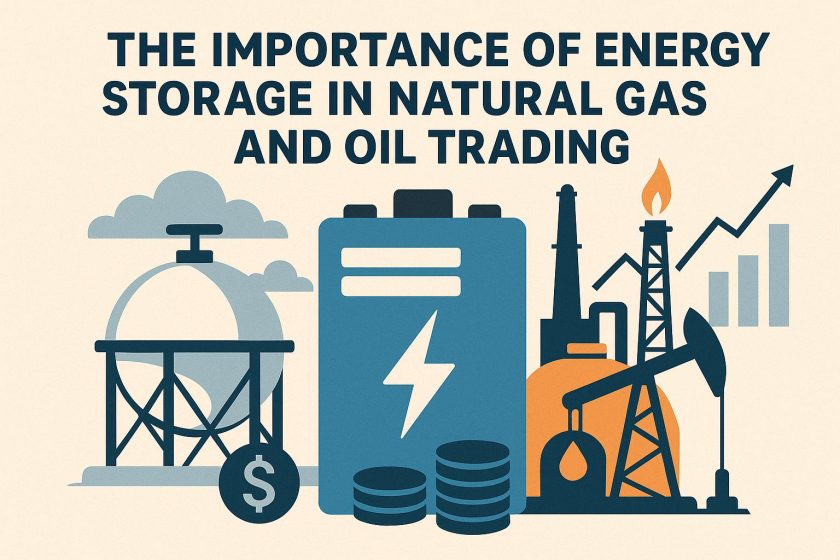The Importance of Energy Storage in Natural Gas and Oil Trading
By : Admin -

The Role of Energy Storage in Natural Gas and Oil Trading
In the rapidly evolving energy market, the significance of energy storage cannot be overstated. As traditional energy sources like natural gas and oil continue to dominate the global energy landscape, the integration of effective energy storage systems plays a crucial role in trading and overall energy management. This document examines the multifaceted role of energy storage in the realms of natural gas and oil trading.
Enhancing Supply Stability
Energy storage systems act as a critical buffer against supply disruptions in the natural gas and oil markets. By storing excess energy during periods when demand is low, these systems ensure an uninterrupted supply during times of high demand. This capability is especially critical for natural gas trading, where fluctuations in demand are common, often influenced by seasonal changes. During winter, for instance, the demand for natural gas typically increases due to heating needs. Energy storage systems allow surplus gas produced or imported during lower demand periods, such as summer, to be stored. Consequently, this stored energy can be released during the peak demand periods, reducing the risk of shortages and therefore helping to stabilize supply chains.
Optimizing Price Management
The volatility of natural gas and oil prices is influenced by a range of factors, including geopolitical events, weather conditions, and even technological advancements. In such a volatile market environment, energy storage offers traders the ability to purchase natural gas and oil when prices are comparatively low and store them until market prices rise, optimizing their price management strategies. This capability to ‘buy low and sell high’ not only helps stabilize market prices but also contributes to enhanced profitability for traders and energy companies. By managing prices effectively, storage solutions allow businesses to be hedge against unexpected price surges. Such stabilization is beneficial not only for individual traders but also for market-wide economic stability, contributing to a more predictable investment environment.
Facilitating Market Integration
Energy storage technologies significantly enable the better integration of oil and natural gas into the broader energy market. These storage solutions, by providing a steady supply of energy, facilitate seamless integration with renewable sources, such as solar and wind energy, which are inherently variable. Renewables, while environmentally beneficial, often face challenges due to their reliance on weather and time conditions—solar panels only generate electricity during daylight hours, for instance. Energy storage systems can store excess energy generated from renewables during peak production times and release it when production declines. This synergy between stored fossil fuels and fluctuating renewable sources helps in creating a more balanced and reliable energy grid. Consequently, this integration supports the broader goals of energy diversification and sustainability.
Promoting Energy Security
The role of energy storage as a key component in strengthening energy security cannot be overstated. A robust storage infrastructure effectively mitigates the risks associated with supply chain disruptions. Such disruptions could be due to geopolitical conflicts, natural disasters, or infrastructure failures. With reliable storage facilities in place, businesses and consumers are assured of consistent access to essential energy resources even during disruptions. This reliability is integral to the sustainable development of economies, as access to energy is a fundamental requirement for industrial operations, government services, and daily life. Moreover, by reducing the dependency on continuous energy imports, domestic energy storage contributes to national security and energy independence.
Energy storage also plays a pivotal role during extreme weather events. For instance, hurricanes or severe winter storms can damage infrastructure and cripple energy supply lines. In such cases, having a reserve of stored natural gas or oil ensures a continued supply to power homes and businesses until normal operations resume. This resilience not only supports the population during crises but also aids in a quicker economic recovery post-disruption.
Learn more about energy trading strategies and how storage solutions are being implemented across the globe.
In summary, the importance of energy storage in natural gas and oil trading is multi-faceted, impacting supply stability, price management, market integration, and energy security. As the world continues to navigate the challenges of energy transition, investing in storage technologies will be instrumental in shaping a resilient energy ecosystem. Embracing advanced energy storage solutions not only bolsters current market operations but also strategically positions the energy sector for future challenges, making it a cornerstone of modern energy management.
This article was last updated on: September 25, 2025